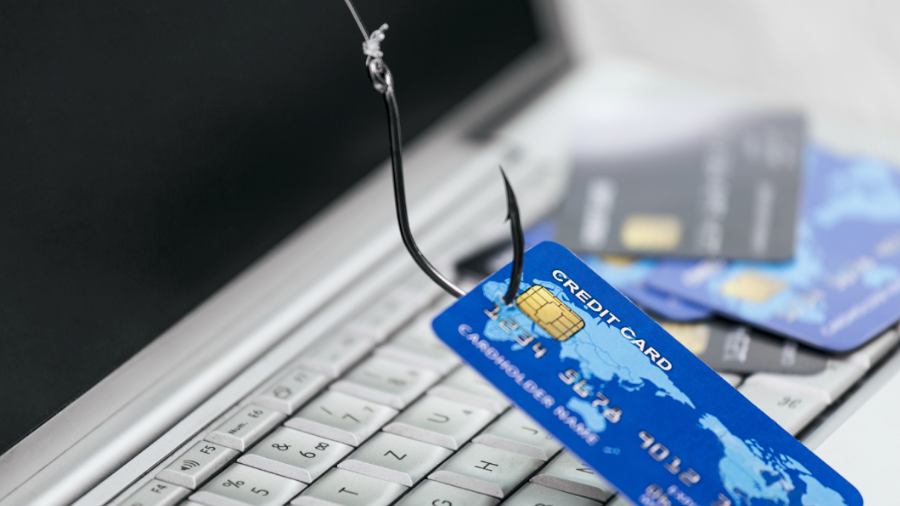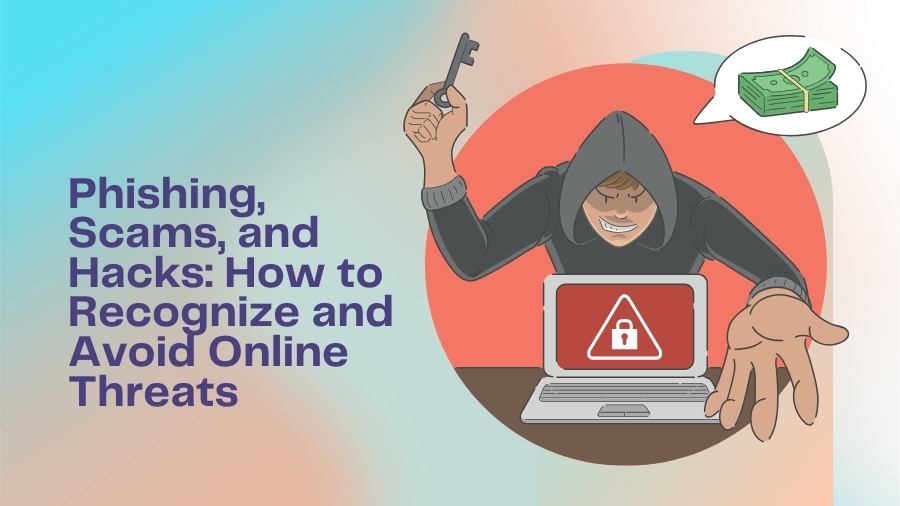The internet is an invaluable resource that has transformed daily life in the digital age with an increasingly connected world providing a wealth of benefits from near instant communication to access to a wealth of information and services. But those benefits aren’t without risk, and the digital landscape is rife with online threats such as phishing, scams, and hacks. Understanding these threats and recognizing and avoiding them is essential for maintaining online safety and protecting sensitive personal information.

Understanding Online Threats
Online threats take many forms, but three of the most common are phishing, scams, and hacks. Each of these exploits vulnerabilities in systems or human psychology to deceive users or gain unauthorized access to information.
Phishing – Phishing is the fraudulent attempt to obtain sensitive information such as usernames, passwords, and credit card details (and, indirectly, money), often for malicious reasons, by disguising as a trustworthy entity in an electronic communication. The most common form of phishing is via email, but it can also happen via text messages, social media, or phone calls.
Scam – A scam is a deceptive scheme or trick used to cheat someone out of something, especially money. Online scams are diverse and often look genuine. They include fake investment opportunities, lottery scams, and online marketplace fraud.
Hack – A hack is the unauthorized intrusion into a computer or network. Hackers exploit flaws and vulnerabilities to gain access, steal information, install malicious software, or carry out other malicious acts.
Recognizing and Avoiding Online Threats
Recognizing and avoiding these threats requires vigilance and an active approach to online security. A few strategies include:
Be Skeptical of Unsolicited Communications
Many of these attempts are related to unsolicited emails or messages, frequently heavily urging action of some kind (perhaps to verify account details or click on a link). However, you ought to be skeptical of any communication asking for sensitive information, especially as it comes in to what looks like a genuine source. Verify what you’re being told by contacting the company directly through official channels.
Use Strong, Unique Passwords
One of the simplest ways to keep yourself safe from hacks is also one of the most effective. Use strong, unique passwords for your online accounts. A password manager can be useful for generating and storing complex passwords.
Keep Software Updated
Hackers can take advantage of vulnerabilities that have been left unpatched by exploiting them with their various types of malware. Keeping your operating system, browser and applications up-to-date means that these vulnerabilities are patched regularly. Set your devices to update automatically where this is possible.
Guard your Personal Information
You should be careful what sort of personal information you’re sharing online, maybe most especially on social media, as scammers can then use the details there to send you convincing phishing or scam emails.
Utilize Security Tools
There’s a lot to be said for security tools. Installing antivirus, enabling two-factor authentication on your online accounts and using a firewall can all provide you with that extra layer of protection, so don’t underestimate the ability these have in keeping you safe.
Digital Protection Tools
It’s clear that digital protection tools can play a huge role in protecting us from a wide array of online threats. Guardio is an example of such a tool, offering automated defense against a selection of threats – including phishing, scams and malicious websites – occurring in real-time. It scans your browsing for threats and seems to do so without interrupting you, meaning that you may be able to get on with using the web as usual.
Guardio is set apart through a comprehensive approach to online security. It provides real-time protection against known threats, but it also leverages advanced algorithms to identify new and evolving scams. Furthermore, Guardio goes even further by alerting users to data breaches that have affected them so that they can take actions to secure those accounts promptly.
The need for a robust tool like Guardio should not be underestimated. With online threats growing in both sophistication and frequency, it has never been more important to ensure that your personal information is safe and that you enjoy a worry-free experience online.
In the end, one of the most powerful tools in the digital world is also one of the most vulnerable to threats, scams, hacks and phishing. These present a very real danger. This could lead to loss of privacy, financial loss and much more. Recognizing and avoiding these threats is critical for everyone from the uninformed to the very experienced. Strategies for avoiding these dangers might include: the simple aforementioned habit of intelligent and cautious internet use, regular updating of software and installation of strong and varied passwords. Additionally, installing digital protection tools like Guardio. With these, users are well on their way to avoiding myriad online threats and staying safe. To be sure, by simply knowing what to look for and avoiding it, users can eliminate, or at least greatly reduce, their exposure to these issues.







Add Comment